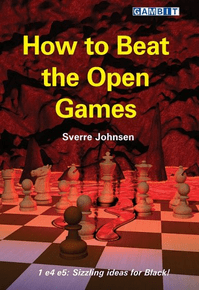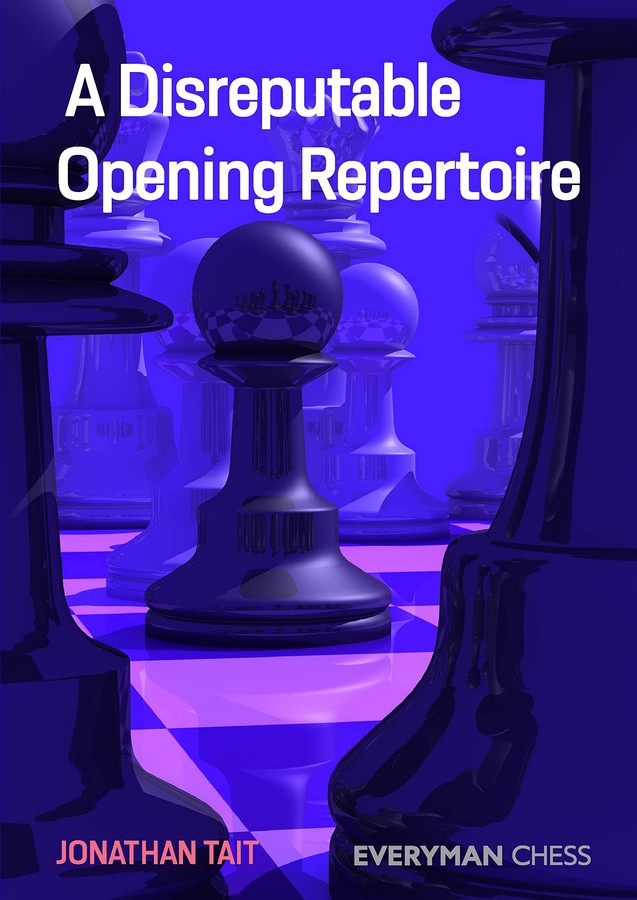| Nivå | C-D |
| Utgivelsesdato | Februar 2022 |
| Forfatter | |
| Pris | 310 NOK |
A Disreputable Opening Repertoire
En skikkelig tøff repertoarbok for svartspillere etter 1 e4 e5. Her foreskrives altså varianter som stort sett har et dårlig rykte, men som det slett ikke er så enkelt å gjendrive eller spille mot i kampens hete.
Disse sjeldne og dels antatt "useriøse" åpningsvalgene blir alle gjennomgått ganske grundig, med både forfatterens erfaringer og vurderinger, analyser med moderne sjakkmotorer og praktiske partier som er spilt, blant annet av Tait selv.
Forlagets egen omtale:
“A highly adventurous repertoire designed to meet 1 e4 with 1…e5 and take the initiative! The main problem Black faces in answering 1 e4 with 1…e5 is the plethora of opening systems available to White: the Ruy Lopez, Giuoco Piano, Scotch, Ponziani, King’s Gambit, Vienna, Bishop’s Opening and so on.
Each is likely to be White’s pet line, which usually means conducting the chess battle on the opponent’s turf. One solution is to study the main lines of all these openings and hope to remember what to do if they appear on the board. Another, more enterprising approach is to turn the tables and make White fight on your territory.
Adopting the latter course, CC-SIM Jonathan Tait shares their investigations into a myriad of disregarded, “disreputable” responses, which can set White thinking as early as move three. These lines are greatly under-estimated by contemporary theory and include weird and wonderful variations such as the Calabrese Counter-Gambit (1 e4 e5 2 Bc4 f5), the Wagenbach Defence to the King’s Gambit (1 e4 e5 2 f4 exf4 3 Nf3 h5), the Romanishin Three Knights (1 e4 e5 2 Nf3 Nc6 3 Nc3 Bc5), the Two Knights Ulvestad Variation (1 e4 e5 2 Nf3 Nc6 3 Bc4 Nf6 4 Ng5 d5 5 exd5 b5) and ultra-sharp lines of the Jaenisch Gambit (1 e4 e5 2 Nf3 Nc6 3 Bb5 f5).
The theory of the variations in this book is generally poorly understood. This has made them successful at all forms of play, including against online computer-assisted assault.”
Fra forfatterens forord:
There are two pertinent points about playing such lines. Firstly, I think it’s important to want to play them, to want defend their honour, to feel protective of them. This provides added motivation at the board, leading to heightened concentration, which in itself should lead to better chess. Secondly, the time limit and strength of opposition may be relevant. Disruptive chess is excellent for blitz and rapid play, whereas you might have concerns about coming out worse against a strong opponent with more time to think.
Nevertheless, my own experience – up to about 2350 Elo (equivalent to my highest OTB
rating) – is that you can pretty much play any old rubbish as long as you know what you’re
doing. Stronger players, too, can struggle against unexpected aggression and may choose
to avoid critical paths, hoping instead to outplay you later. Okay, they can try. And please
note: this particular rubbish is not complete rubbish. Some lines may teeter on the edge of
soundness as the engines get ever stronger, such that Stockfish 17 may refute the whole lot
in five minutes, but they have stood up to computer-assisted analysis pretty well thus far.
The Wagenbach even featured in the 9th Computer Championship Final (2019), scoring
1½/2 for Black.
| Innbundet? | Nei |
| Type | Bok |
| Språk | Engelsk |
| Antall sider | 354 |
Se også
-

How to Beat the Open Games 1 e4 e5: Sizzling ideas for Black!
KjøpEn sterk tillitserklæring for Sverre Johnsen som åpningsbokforfatter at forlaget Gambit kommer med enda en ny bok om å spille 1 e4 e5 som svart. Her dekkes alt unntatt Spansk, og dels med flere alternativer som mot 2 Sf3 Sc6 3 Lc4 både 3...Sf6 og 3...Lc5.
- Pris
- 275
- Nivå
- B-D
- Av
- Utgivelsesdato
- April 2018

